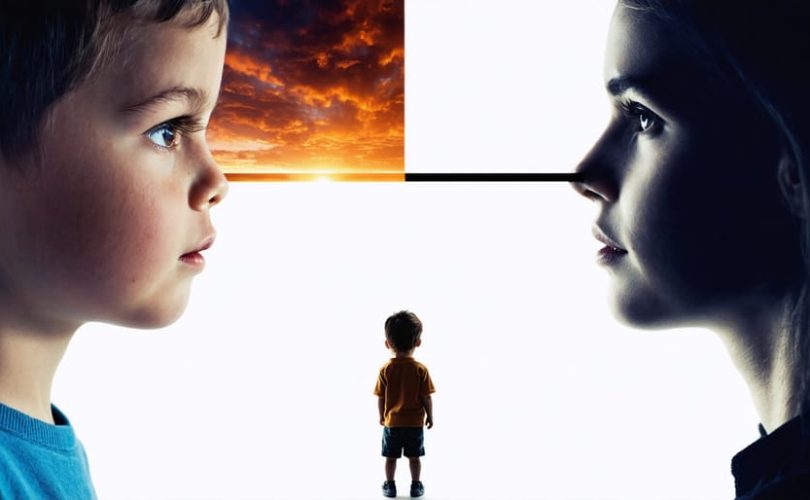Growing up with a parent who has bipolar disorder shapes a child’s emotional landscape in profound and lasting ways. For millions of children worldwide, navigating the unpredictable rhythms of life with a bipolar parent creates a unique set of challenges and opportunities for emotional growth. These experiences often leave lasting imprints on personality development, relationship patterns, and mental health outcomes well into adulthood.
Recent research reveals that children of bipolar parents develop remarkable resilience and emotional intelligence, even as they face increased risks for anxiety, depression, and stress-related conditions. Understanding these impacts isn’t just about acknowledging challenges – it’s about recognizing the complex interplay between genetic predisposition, environmental factors, and the powerful role of early intervention and support.
Whether you’re a mental health professional, concerned family member, or someone reflecting on your own childhood experiences, exploring this topic offers crucial insights into breaking generational patterns and fostering healthy emotional development. Through understanding comes the power to transform challenging circumstances into opportunities for growth, healing, and positive change.
Understanding the Bipolar Parent’s Impact
Emotional Rollercoaster: Living with Mood Swings
Children of parents with bipolar disorder often find themselves navigating an unpredictable emotional landscape at home. During manic episodes, a parent might be extraordinarily energetic, making grand plans and showering their children with attention and gifts. These periods can feel exciting but also overwhelming and confusing for young ones who sense something isn’t quite right.
When depression takes hold, the same parent might become withdrawn, unable to maintain regular routines or provide consistent emotional support. Children might find themselves taking on adult responsibilities, like preparing meals or caring for younger siblings. This role reversal, known as parentification, can be particularly challenging for young minds to process.
The constant shifts between these extremes can leave children feeling anxious and unsure about what each day might bring. They often develop a heightened sensitivity to their parent’s moods, becoming expert “emotional weathervanes” – constantly scanning for signs of change in their parent’s behavior. While this adaptability shows remarkable resilience, it can also create lasting patterns of hypervigilance and emotional uncertainty that may need addressing as they grow older.

Unpredictable Parenting Patterns
Children of parents with bipolar disorder often experience a challenging “emotional rollercoaster” as their parent’s mood shifts between manic and depressive episodes. During manic phases, a parent might be extremely energetic, engaging, and overly permissive – perhaps allowing extended bedtimes, excessive treats, or making grand promises. These same parents may become withdrawn, emotionally unavailable, or irritable during depressive episodes, struggling to maintain basic household routines or respond to their child’s needs consistently.
Dr. Sarah Martinez, a child psychologist, explains: “Children thrive on predictability and structure. When parenting styles fluctuate dramatically, children often struggle to develop a secure sense of what to expect from their relationships and environment.”
This inconsistency can lead children to become hypervigilant, constantly monitoring their parent’s mood and adjusting their behavior accordingly. Some children might take on a caretaking role, while others might withdraw or act out in response to the uncertainty. As one adult child shares, “I never knew which version of my mom I’d get each morning. I learned to read her mood before asking for anything, even basic needs like help with homework.”
Common Challenges Children Face
Role Reversal and Parentification
One of the most significant impacts on children of bipolar parents is the reversal of traditional family roles. Children often find themselves stepping into a caretaking position, a phenomenon known as parentification. This occurs when young ones feel compelled to become emotional supporters or practical caregivers for their bipolar parent.
During manic or depressive episodes, children might take on adult responsibilities like preparing meals, managing household tasks, or caring for younger siblings. They may also feel responsible for their parent’s emotional well-being, monitoring mood changes, and trying to prevent episodes. As Sarah, a therapist specializing in family dynamics, explains, “These children learn to be hyper-vigilant, constantly reading their parent’s emotional state and adjusting their behavior accordingly.”
This role reversal can have lasting effects on a child’s development. While these children often develop remarkable resilience and empathy, they frequently miss out on typical childhood experiences. They may struggle to form balanced relationships later in life, having learned to prioritize others’ needs above their own.
It’s important to recognize that this dynamic, while common, isn’t inevitable. With proper support systems and treatment for the parent, families can work toward maintaining healthier boundaries and allowing children to experience their childhood fully.

Emotional Security and Attachment Issues
Growing up with a bipolar parent can significantly impact a child’s ability to form secure attachments and develop emotional stability. The unpredictable nature of bipolar disorder often creates an inconsistent emotional environment, where children may experience their parent as warmly attentive one day and emotionally distant the next.
Dr. Sarah Chen, a child psychologist specializing in family dynamics, explains: “Children need consistency and reliability to develop trust in relationships. When a parent’s mood fluctuates dramatically, children may struggle to predict emotional responses, leading to anxiety and uncertainty in their attachments.”
These early experiences can shape how children approach relationships throughout their lives. Many adults who grew up with bipolar parents report difficulties trusting others, fear of abandonment, and challenges in maintaining stable relationships. They might develop a heightened sensitivity to others’ emotional states or adopt a caretaking role in relationships, mirroring their childhood experiences.
“I never knew which version of my mom I’d get each morning,” shares Michael, now 35. “This made it hard for me to feel secure in any relationship. I’m always waiting for the other shoe to drop.”
However, it’s important to note that with awareness and support, these attachment challenges can be addressed. Through therapy and understanding these patterns, individuals can develop healthier relationship dynamics and build stronger emotional connections.
Long-term Effects on Mental Health
Anxiety and Depression Risks
Children who grow up with a bipolar parent face an increased risk of developing anxiety and depression during their formative years and into adulthood. Research shows that these children often experience heightened stress levels due to the unpredictable nature of their home environment, which can trigger emotional challenges of their own.
Dr. Sarah Martinez, a child psychologist specializing in family dynamics, explains, “These children frequently internalize their emotions and may struggle with feelings of guilt, believing they’re somehow responsible for their parent’s mood swings. This emotional burden can manifest as anxiety or depressive symptoms.”
Common signs include difficulty sleeping, changes in appetite, withdrawal from social activities, and persistent worry about their parent’s well-being. Many children also develop hypervigilance, constantly monitoring their environment for signs of their parent’s mood changes.
However, it’s important to remember that these outcomes aren’t inevitable. Early intervention, professional support, and strong relationships with stable adults can significantly reduce these risks. Creating a consistent routine, encouraging open communication, and providing access to mental health resources can help children build resilience and develop healthy coping mechanisms.
Self-esteem and Identity Formation
Growing up with a bipolar parent can significantly impact a child’s self-esteem and identity development. Children often internalize the unpredictable nature of their home environment, leading to confusion about their own worth and role within the family. Many struggle with self-doubt, questioning whether they’re responsible for their parent’s mood swings or if they’re somehow “not good enough.”
Dr. Sarah Chen, a child psychologist, notes that these children frequently become “emotional chameleons,” adapting their behavior and personality to match their parent’s current state. This constant adjustment can make it difficult for them to develop a strong, authentic sense of self.
Children might also face challenges in understanding their own emotions and establishing healthy boundaries. They may feel responsible for their parent’s wellbeing, taking on a caretaker role that can overshadow their own developmental needs. This role reversal, known as parentification, can lead to perfectionist tendencies and difficulty prioritizing their own needs in relationships.
However, with proper support and understanding, these challenges can be transformed into strengths. Many children of bipolar parents develop remarkable resilience, emotional intelligence, and empathy. Professional guidance can help them build a healthy self-image while honoring their unique experiences and perspectives.
Support and Coping Strategies
Building Resilience
Developing emotional strength is crucial for children growing up with a bipolar parent. Mental health experts recommend several strategies to build resilience and cope with challenging family dynamics.
First, establish consistent routines and boundaries. Having predictable daily schedules can provide a sense of stability, even when a parent’s mood fluctuates. This might include regular meal times, homework periods, and bedtime rituals.
Create a support network of trusted adults who understand the situation. This could include teachers, school counselors, relatives, or family friends who can offer guidance and emotional support when needed. These relationships provide safe spaces for children to express their feelings and seek help.
Practice self-care and emotional awareness from an early age. Teaching children to identify and express their emotions healthily helps them process their experiences. Simple techniques like deep breathing, journaling, or artistic expression can become valuable coping tools.
Remember that it’s okay to seek professional help. Family therapy or individual counseling can provide additional support and strategies for managing complex emotions. Many children find comfort in support groups where they can connect with peers who share similar experiences.
Focus on building self-worth independent of the parent’s condition. Encourage participation in activities that boost confidence and provide a sense of accomplishment, whether through sports, arts, academics, or hobbies.
Finding Help and Support Systems
If you’re navigating the challenges of growing up with a bipolar parent, know that you’re not alone and support is available. Many organizations offer specialized help for families affected by bipolar disorder, providing both immediate assistance and long-term resources.
Mental health professionals, particularly those specializing in family therapy, can help process complex emotions and develop healthy coping strategies. Support groups, both in-person and online, connect you with others who share similar experiences, offering a safe space to share stories and learn from one another.
School counselors and teachers can be valuable allies, especially for children and teenagers. They can provide emotional support and help create accommodations when needed. Many schools also offer mental health resources and can connect families with additional community services.
National organizations like NAMI (National Alliance on Mental Illness) provide educational resources, helplines, and support group directories. Local mental health clinics often offer family education programs and crisis intervention services when needed.
For adults who grew up with bipolar parents, therapy can help address lingering effects and build healthier relationship patterns. Some therapists specialize in adult children of parents with mental illness, offering targeted support for your specific experiences.
Remember, seeking help isn’t a sign of weakness – it’s a powerful step toward healing and understanding. Your well-being matters, and there are people and resources ready to support your journey.

Growing up with a bipolar parent presents unique challenges, but it’s important to remember that healing, growth, and breaking cycles of intergenerational trauma are all possible. Children who have experienced this journey often develop remarkable resilience, emotional intelligence, and empathy that serve them well in adulthood.
Support systems and resources are more accessible than ever before. Family therapy, support groups, and mental health professionals specializing in family dynamics can provide valuable guidance and tools for both parents and children. Many communities now offer specialized programs for families affected by bipolar disorder, creating safe spaces for sharing experiences and learning coping strategies.
Remember that every family’s journey is unique, and there’s no one-size-fits-all approach to healing. While the impacts of growing up with a bipolar parent can be significant, understanding these effects is the first step toward positive change. With proper support, education, and compassion, children can develop healthy relationships, emotional regulation skills, and strong self-identity despite early challenges.
If you’re a parent with bipolar disorder, know that seeking help isn’t just for you—it’s a powerful gift to your children. If you’re someone who grew up with a bipolar parent, remember that your experiences are valid, and it’s never too late to seek support and work toward personal growth. The cycle of understanding, healing, and growth continues with each generation that chooses to face these challenges with courage and hope.

